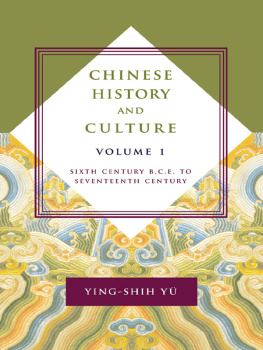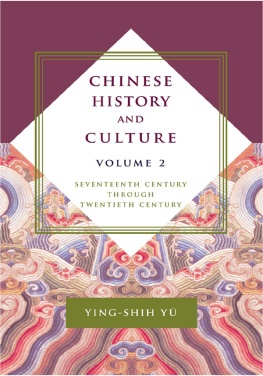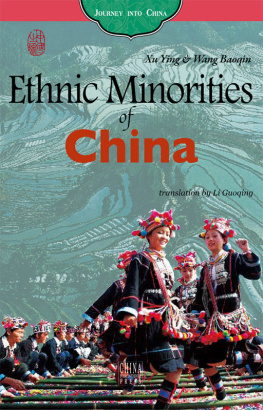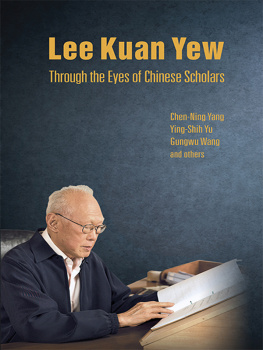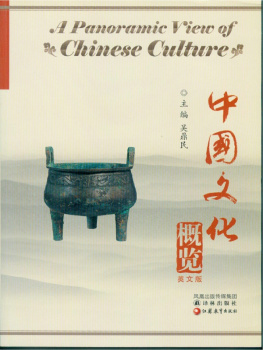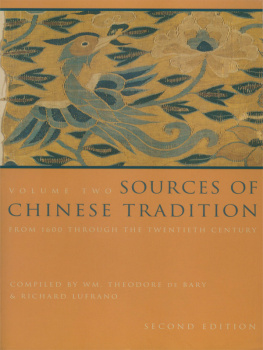Table of Contents
Chinese History and Culture
VOLUME 1
MASTERS OF CHINESE STUDIES
Chinese History and Culture
VOLUME 1
SIXTH CENTURY B.C.E. TO SEVENTEENTH CENTURY
Ying-shih Y
With the editorial assistance of Josephine Chiu-Duke and Michael S. Duke
COLUMBIA UNIVERSITY PRESS
NEW YORK
Columbia University Press wishes to express its appreciation for assistance given by the Chiang Ching-kuo Foundation for International Scholarly Exchange and Council for Cultural Affairs in the publication of this book.
Columbia University Press
Publishers Since 1893
New York Chichester, West Sussex
cup.columbia.edu
Copyright 2016 Columbia University Press
All rights reserved
E-ISBN 978-0-231-54201-2
Library of Congress Cataloging-in-Publication Data
Names: Y, Ying-shih, author.
Title: Chinese history and culture : sixth century B.C.E. to seventeenth century / Ying-shih Y; with the editorial assistance of Josephine Chiu-Duke and Michael S. Duke.
Description: New York : Columbia University Press, 2016. | Series: Masters of Chinese studies | Includes bibliographical references and index.
Identifiers: LCCN 2015040772 (print) | LCCN 2015049874 (ebook) | ISBN 9780231178587 (vol. 1 : cloth : alk. paper) | ISBN 9780231542012 (electronic) | ISBN 9780231178600 (vol. 2 : cloth : alk. paper) | ISBN 9780231542005 (electronic : vol. 2)
Subjects: LCSH: ChinaHistory. | ChinaCivilization.
Classification: LCC DS736 .Y867 2016 (print) | LCC DS736 (ebook) | DDC 951dc23
LC record available at https://lccn.loc.gov/2015040772
A Columbia University Press E-book.
CUP would be pleased to hear about your reading experience with this e-book at .
COVER DESIGN: CHANG JAE LEE
Dedicated to Monica Shu-ping Chen Y
CONTENTS
C ollected in these two volumes are essays published during the past five decades, on various aspects of Chinese cultural and intellectual traditions and their modern transformations. Written on different occasions and in different times, they are scattered in a great variety of publications, some obscure and out of print. However, since all of them possess, to a greater or lesser degree, a unity of theme regarding the Chinese tradition in its historical changes, I consider it desirable to make them accessible to the general reading public by way of reprinting in a collected form.
It is my extraordinary fortune that two of my highly esteemed colleagues, Professors Josephine Chiu-Duke and Michael S. Duke, agreed to serve as editors of my two volumes. They have edited each and every one of my essays with meticulous and diligent care, resulting in the elimination of a great deal of imperfections in the original versions. I am particularly grateful to both of them for providing, in the Editorial Note, a lucid account of my views discussed in these essays. It is also remarkable that instead of taking my views in the English essays as a self-contained category, they have made every effort to understand them in the context of my published oeuvre as a whole and specifically emphasized their interrelatedness to my Chinese writings.
In this connection, a word may be said about my bilingual historical writings. Generally speaking, since the 1970s, it has been an established practice on my part to write book-length monographical studies in Chinese and present these findings in a more concise format in English as articles in journals, periodicals, or symposia. The difference is more than between a longer and a shorter version, however; it also has something to do with two different ways of historical representation. Full documentation is often emphasized in Chinese historical writingstraditional and modernas a positive feature. As a result, direct quotation of original sources has been established as a common historical method. On the other hand, I deeply appreciate the Western style of argumentation in historical studies that, more often than not, refrains from extensive quotation of sources. Thus, in writing bilingually, I often secretly wished that my two versions might somehow strengthen and supplement, as well as complement, each other.
I wish to take this opportunity to express my deep gratitude to Professor David Der-wei Wang for his kindness and, indeed, patience in including these two volumes of mine in a series of books he has specifically designed for Columbia University Press. I also wish to thank all of the various presses for generously granting their respective permissions to reprint my essays, Mr. Jeff S. Heller of Princetons East Asian Studies Department for conveying materials back and forth to the editors, and Ms. Su Hue Kim for her years of preparing my many drafts into typed form.
I dedicate these two volumes to my wife, Monica Shu-ping Chen Y, whose abiding love and support have sustained me throughout my career.
Ying-shih Y
September 2, 2015
Professor Y exerted himself to complete a major revision of the article on Wang Yangming (14721529) in late 2014, but his health has prevented him from writing an introduction to these two volumes, and his deep modesty would also not permit us to use his address on receiving the Kluge Prize and his Tang Prize in Sinology acceptance speech as a comprehensive introduction. Thus, at the risk of not doing full justice to the breadth and depth of his creative contribution to the field of Chinese studies, we feel it necessary to offer a few initial observations on the primary concerns that have emerged in his research on Chinas cultural and intellectual tradition, while also explaining the structure of this book of essays.
Since Professor Y left China in the beginning of 1950 and enrolled in the first class of the then newly established New Asia College in Hong Kong, two questions have always dominated his intellectual consciousness: As an ancient civilization, what was Chinas essential value system that had sustained the life of its culture through ages of tumultuous political changes? Furthermore, would this system survive its modern revolutionary overhaul and find its way to secure itself as a culture that has historically displayed a great deal of overlapping consensus in basic values with the mainstream of Western culture? In a way, these two questions are tied to his overall concern about where China would go after the radical transformation of its 1949 revolution. The rich body of his decades of research that started during his college days in Hong Kong and continued throughout his academic life at the universities of Michigan, Harvard, Yale, and Princeton, and especially the work he carried out during the time after he retired from Princeton in 2001, reflects his examinations of and responses to these key questions.

